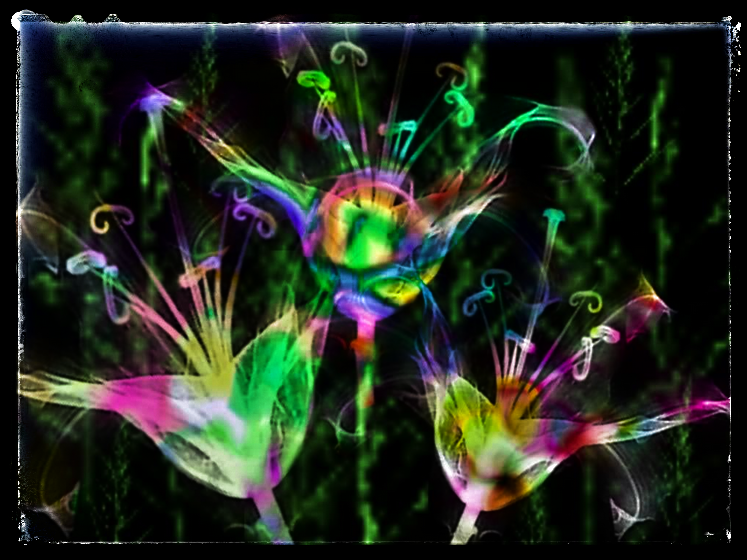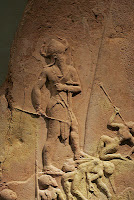The lily.
It is hard to find when the translation of asphodel meadow into a flower filled, fragrant field began.
I don't think it began with Homer.
*
From The Odyssey book 11.
She came to deep-flowing Oceanus, that bounds the Earth, where is the land and city of the Cimmerians, wrapped in mist and cloud. Never does the bright sun look down on them with his rays either when he mounts the starry heaven or when he turns again to earth from heaven, but baneful night is spread over wretched mortals. Thither we came and beached our ship, and took out the sheep, and ourselves went beside the stream of Oceanus until we came to the place of which Circe had told us.
There is no sun.
Everywhere is fuzzy
Indistinct.
From The Odyssey book 24.
Then Mercury of Cyllene summoned the ghosts of the suitors, and in his hand he held the fair golden wand with which he seals men's eyes in sleep or wakes them just as he pleases; with this he roused the ghosts and led them, while they followed whining and gibbering behind him.
As bats fly squealing in the hollow of some great cave, when one of them has fallen out of the cluster in which they hang, even so did the ghosts whine and squeal as Mercury the healer of sorrow led them down into the dark abode of death.
When they had passed the waters of Oceanus and the rock Leucas, they came to the gates of the sun and the land of dreams, whereon they reached the meadow of asphodel where dwell the souls and shadows of them that can labour no more.
Where two rivers meet, shrouded in the foggy gloom, Odysseus sees a grove of trees and a meadow of Asphodel.
As he walks into the meadow
"The dead approach him in swarms, unable to speak unless animated by the blood of the animals he slays. Without blood they are witless, without activity, without pleasure and without future".The Elysian Fields were, according to Homer, located on the western edge of the Earth by the stream of Okeanos. Hesiod refers to Elysium in Works and Days as the Fortunate Isles or the Isles (or Islands) of the Blessed, located in the western ocean at the end of the earth. Pindar, describes a single island with shady parks; there the population spend all day engaged in sport or music.
So why are the meadows of Hesiod and Pindar so much nicer than Homer's; for there are no anaemic ghosts in the Blessed Isles? Are they even talking about the same place?
The simple answer is that the Homeric meadow full of Asphodel is probebly a pun on the ash-like, dust and gloom of the Mesopotamian after-life. The ash of cremation.The word Asphodel has become a type of lily, now daffodil...recalling the flower-strewn meadow Persephone is abducted from, the flowers decorating the grave or the wreaths of flowers adorning the sacrificial cattle...and possibly because of Cretan myth.
Pausanias likewise states that the asphodel is sacred to Persephone and the Chthonic deities; the Rhodians garland with asphodel Kore and Artemis.
But this is not what Homer meant?
I think that the flower-filled meadow has been added onto Homer's description from elsewhere.
An elsewhere Hesiod is describing when he says that:
"...Zeus the son of Kronos gave a living and an abode apart from men, and made them dwell at the ends of earth. And they live untouched by sorrow in the Islands of the Blessed (Nesoi Makarôn) along the shore of deep swirling Okeanos, happy heroes for whom the grain-giving earth bears honey-sweet fruit flourishing thrice a year, far from the deathless gods, and Kronos rules over them; for the father of men and gods released him from his bonds. And these last equally have honour and glory."Despite the idea that the Elysian fields are strewn with Asphodel; the Asphodel meadow "where the spirits of the dead dwell" is probably not the same place as the Elysian plain.
The Asphodel meadow is located at the edge of Hades, a place within the Underworld, whilst the Elysian fields are just beyond the Twin Peaks; the first hour of the (Egyptian) Twelve Gates.
Granted, they are both in the West...
Walter Burkert notes the connection with the motif of far-off Dilmun as described in the Epic of Gilgamesh.
This places the Elysian field behind sun-set- the first hour of the night-time sun.
Hecataeus of Abdera was said to have compared the Homeric asphodel ( ἀσφοδελὸν λειμῶνα) from The Odyssey book 24 to the:
"most beautiful meadows around Egyptian Memphis, which are full of marsh-meadow, lotus, and calamus"The first hour beyond the twin peaks is not the realm of Hades, it is not quite the realm of the dead, and it was considered possible for the living to travel through the twelve gates of night on 'The Boat of Millions' the solar barque...
So maps like this are slightly misleading.
There isn't always an Underworld.
The land of the dead is sometimes just a very long way away.
Beyond.
Nevertheless, just getting to the first hour beyond the gates of the sun is extremely difficult, a journey only a person related to a god (a hero) can accomplish.
By circa 2000 BC, a Mesopotamian poem: The Death of Ur-Nammu- a king who died on the battle-field against the Gutians (after he had been abandoned by his army) makes it explicit that a hero may achieve a better place in the Underworld as a result of daring to reach Dilmun. Or by having a connection with a hero.... in the Odyssey book 4 Menelaus is told by Proteus that the immortals will send him to the Elysian Plain:
As for your own end, Menelaus, you shall not die in Argos, but the gods will take you to the Elysian plain, which is at the ends of the world. There fair-haired Rhadamanthus reigns, and men lead an easier life than any where else in the world, for in Elysium there falls not rain, nor hail, nor snow, but Oceanus breathes ever with a West wind that sings softly from the sea, and gives fresh life to all men. This will happen to you because you have married Helen, and are Jove's son-in-law.'
Initially the Elysian plain was understood to be separate from the realm of Hades, and admission was reserved for mortals related to the gods and other heroes.
Later, admission expanded to include those chosen by the gods, the righteous, and the heroic, where they would remain after death, to live a blessed and happy life, and indulging in whatever employment they had enjoyed in life.
To be struck by lightning was to be god-chosen.
To be killed by lightning was an instant translocation to 'heaven'.
Places struck by lightning were known not only as enelysia, but also as elysia.
A man struck by lightning was enelysios 'in Elysium'.
A man struck by god was Diobletos or Diobles, touched by an immortal, struck by immortality.
According to Plutarch a man killed by lightning would not decay:
But...no lilies.
There were never any lilies.
The asphodel are made of ash...
Is there no way back to the pretty flowers?
The prince of lilies.
θεά των κρίνων
The Goddess of the lilies...
 |
| large Minoan cup, or fruit bowl, Phaistos, Crete, ca. 2000-1900 BCE. |
Edith Hamilton suggests that the Asphodel of these fields are not exactly like the Asphodel of our world but are "presumably strange, pallid, ghostly flowers."
Enough for now!
Evangeline
Henry Wadsworth Longfellow
Here on its fragile stalk, to direct the traveler's journey
Over the sea-like, pathless, limitless waste of the desert.
Such in the soul of man is faith. The blossoms of passion,
Gay and luxuriant flowers, are brighter and fuller of fragrance,
But they beguile us, and lead us astray, and their odor is deadly.
Only this humble plant can guide us here, and hereafter
Crown us with asphodel flowers, that are wet with the dews of nepenthe."







